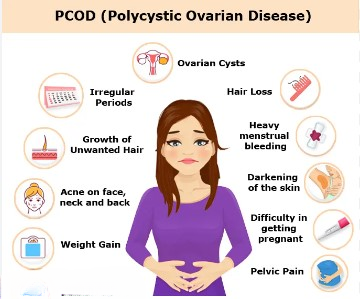PCOD stands for Polycystic Ovary Disease, a hormonal disorder common among women of reproductive age. The condition is characterized by enlarged ovaries with multiple small cysts, which are fluid-filled sacs. These cysts are actually follicles, each containing an immature egg that doesn’t reach full maturity due to hormonal imbalances.
Symptoms of PCOD
Women with PCOD may experience a range of symptoms, which can vary in severity. Some common signs include:
- Irregular menstrual cycles: Women with PCOD often have irregular periods, which can range from very light to heavy bleeding.
- Excess androgen: Elevated levels of male hormones (androgens) can cause symptoms such as acne, excess facial and body hair (hirsutism), and male-pattern baldness.
- Polycystic ovaries: As mentioned earlier, the ovaries may become enlarged and contain numerous small follicles.
- Insulin resistance: Many women with PCOD have insulin resistance, which can lead to weight gain, difficulty losing weight, and an increased risk of type 2 diabetes.
- Fertility issues: PCOD is one of the leading causes of female infertility due to irregular ovulation or lack of ovulation.
Conclusion
PCOD is a complex condition that requires personalized care and attention. Dr. Sarita Agarwal, a trusted gynecologist in Pratap Nagar, Jaipur, brings expertise and compassion to her practice, ensuring that each patient receives comprehensive care tailored to their needs. If you or someone you know is struggling with PCOD symptoms, don’t hesitate to seek professional help. Early diagnosis and management can make a significant difference in managing symptoms and improving overall health and well-being.






Comments